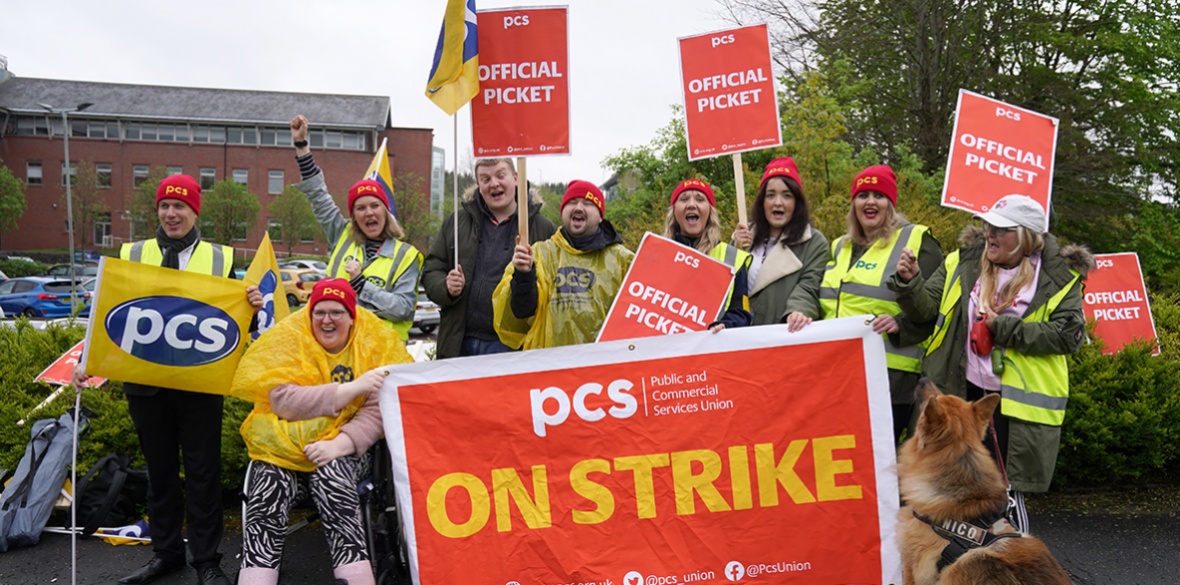This is the last article you can read this month
You can read more article this month
You can read more articles this month
Sorry your limit is up for this month
Reset on:
Please help support the Morning Star by subscribing here
OVER the course of the last year, hundreds of thousands of workers have taken strike action in the biggest wave of industrial struggle in a generation. A year ago, the RMT began a national strike on the railways, followed by postal workers, teachers, civil servants, nurses, lecturers, junior doctors and more.
An estimated 2.42 million working days were lost to strike action between June and December 2022 — 556,000 working days were lost in March 2023 alone.
This Saturday, hundreds of workers from across unions will be coming together at the How We Fight, How We Win Rank-and-File Organising Conference to discuss the strengths and weaknesses of the strike wave, the kind of strategy we need to win, and the politics of the movement. It will be a key opportunity for workers at the base of the trade unions to get organised and make sure we fight to win.
The conference has been supported by a wide range of trade union and movement organisations like NHS Workers Say No, the People’s Assembly and Strike Map, as well as dozens of trade union branches and trades councils across the country.
The conference comes at a critical juncture in the struggle. The strike wave was primarily ignited by a cost-of-living crisis that has seen millions of working people struggling to afford food, energy and housing. Almost a third of all children in Britain are currently living in poverty.
The sharply increasing inequality in Tory Britain was brought to the fore during the pandemic as rich Tory donors were handed over huge sums of public money and billionaires like Jeff Bezos and Elon Musk expanded their wealth by grotesque proportions while the majority of people suffered.
The pandemic clarified who the “essential workers” in society were, and that they are also the lowest-paid and working in the worst conditions. The roots of the current strike wave lie in the new-found confidence of workers to organise and fight, and in many cases win, since 2021.
Millions of workers have been inspired by the strikes and the strength of collective action. BBC2’s documentary Strike: Inside the Unions captured the powerful moment Amazon workers walked out of their warehouse in Coventry on the first day of a GMB strike.
Public support for the strikes has also remained strong despite the attacks in the mainstream media. But a year on, we have yet to see a major national victory. The Tory government, on its third Prime Minister in this time and at war with itself, continues to limp on — making workers pay to keep profits up and passing new anti-union laws.
Part of the reason that they have been able to do this is the limited nature of the strikes. For the most part, we have only had one-day or two-day strikes, and they have remained separated on sectoral lines.
The March 15 co-ordinated day of action saw up to 750,000 workers in education, health, transport and the Civil Service strike together. The effectiveness of the joint action, the power displayed by the shutdown of London with hundreds of thousands on the streets and the solidarity between workers was clear. But it took over nine months to get to that point — and it was just one day.
The crisis is one that affects all working people and goes deeper than individual pay disputes. A Tory minister questioned why rail workers hadn’t been given an improved offer explained that conceding to one group of workers would set a precedent for other groups of workers.
The Tories get that our fights are part of the same struggle, that a victory for one helps all, and that together we are stronger, so why has that not been capitalised on by our side?
In my experience visiting picket lines over the last year, this is common sense among rank-and-file trade unionists, but it is not reflected in the strategies pursued by union leadership.
In the RCN, the impressive #VoteReject campaign succeeded in stopping a deal and forcing the union to call more strike action and to reballot to renew their mandate.
The campaign was a great example of the need for and strength of rank-and-file organising within and across unions to ensure leaders are held to account and we fight for what we deserve.
We can’t shy away from wider political questions either. The trade union movement has to be at the forefront of defending our public services, defeating the assault on our right to organise and the erosion of our civil liberties, as well as opposing racism and war and fighting climate change.
It was Border Force workers who threatened to strike if they were made to stop refugees in the Channel, Rolls Royce workers in Barnoldswick won their strike to save their jobs but also forced the company to develop green technology, and offshore workers in Scotland who are striking for better pay have democratically developed a programme to move their jobs away from fossil fuel extraction.
Unions won’t necessarily harness labour power to fight for wider questions of social justice, but rank-and-file members can make sure they do.
Come along to the conference this Saturday, join the discussion and let’s get organised.
How We Fight, How We Win Rank-and-File Organising Conference, Saturday June 10, 10.30am-5pm, will be held at the Rich Mix, Bethnal Green Road, London. The conference will be followed by a strike solidarity benefit social with Lowkey, David Rovics, Maddy Carty and others to raise money for strike funds.











